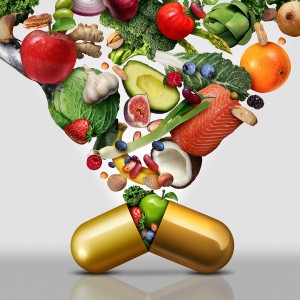Eat Right for Your Eyes
 There is one universal truth of every American Mom detailing a certain food and the eyesight of her children. There you were pushing your mushy carrots around your plate trying to stall enough to not have to eat them. To which your mom said, “You better eat those carrots, or your eyes will be like Jimmy who needs those pop bottle-thick glasses!”
There is one universal truth of every American Mom detailing a certain food and the eyesight of her children. There you were pushing your mushy carrots around your plate trying to stall enough to not have to eat them. To which your mom said, “You better eat those carrots, or your eyes will be like Jimmy who needs those pop bottle-thick glasses!”
But does pretending you’re Bugs Bunny really help your eyes?
Since at Millennium Park Eye Center, we’re all about keeping our patients’ eyesight in good order, let’s get into some foods that are good for your eyes in this end-of-summer blog.
The eyes like long-term nourishment
Unlike foods that can instantly give you more energy (think pasta before a marathon) or help build muscle tone and the like, foods that benefit your eyes serve a protective function, keeping them healthier and helping them ward off vision problems.
- Carrots — Carrots are full of beta-carotene, a type of vitamin A that helps the retina and other parts of the eye to function. Beta-carotene gives fruits and vegetables their orange hue, so you’ll find it in carrots, sweet potatoes, winter squash, apricots, and cantaloupe.
- Lutein and zeaxanthin — Your Mom didn’t tell you about lutein and zeaxanthin, but she would have had she known about these two antioxidants. Lutein and zeaxanthin help the eyes to ward off cataracts and macular degeneration. Leafy green vegetables (cooked kale and spinach are the highest sources) and other green and yellow vegetables are good sources of these antioxidants. Eggs also have lutein and zeaxanthin, along with zinc. The macula has high levels of zinc.
- Citrus and berries — Citrus and berries and full of health benefits. These fruits are great sources of vitamin C (also known as ascorbic acid). Vitamin C is a powerful antioxidant that helps the body form and keep its connective tissue, including collagen found in the cornea of the eye. It also reduces the risk for the formation of cataracts and macular degeneration. You’ll find vitamin C in berries, sweet red peppers, broccoli, and oranges.
- Almonds — And despite being serious water pigs in California, almonds are loaded with vitamin E, another ally in the fight against macular degeneration and cataracts. Vitamin E appears to neutralize oxidation in the eyes. Cataracts, for example, are formed by oxidation in the lens of the eye caused by the UV rays in sunlight. Almonds, sunflower seeds, cereal with wheat germ, hazelnuts, peanuts, and peanut butter are all good sources of vitamin E.
- Oily fish — Finally, get a little fishy when warding off macular degeneration. Oily fish like tuna, mackerel, salmon, and trout are rich in omega-3 fatty acid. A diet heavy in omega-3 fatty acids has been shown to reduce age-related macular degeneration by 38 percent.
So, maybe your Mom was onto something with her “Eat your carrots” admonishments. You take care of the food; we’ll take care of the eye exams and the like. Is it time for your next exam? Call us at Millennium Park Eye Center, (312) 996-2020, to make your appointment.
Category:


